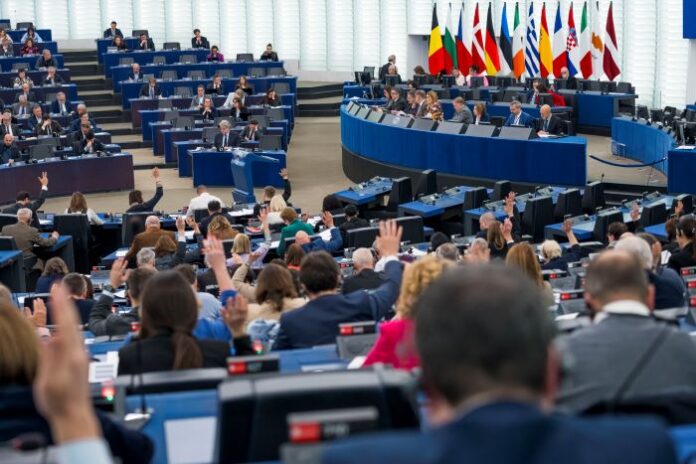The European Parliament has adopted a resolution with 330 votes in favour, 254 against, and 26 abstentions about the rule of law in Greece. The resolution expresses serious concerns about the violations of the rule of law, media freedom, and fundamental rights in the country.
Greece has been under the governance of the EPP-affiliated government of Kyriakos Mitsotakis since 2019.
The resolution relies on facts and information that independent experts, NGOs, and media organisations have repeatedly confirmed. There is a long list of threats to the rule of law in Greece, including threats and attacks against journalists from high-ranking politicians and ministers, the illegal use of spyware like Predator against journalists and political opponents, the murder of journalist Giorgos Karaivaz in 2021 and its improper investigation, and the Petsas List scandal where €20 million of state-funding was distributed among government-friendly media outlets.
Despite this, the EPP Group still supports the Greek government. Today, it refused to support the resolution. Unlike previous Parliament resolutions on the rule of law in non-EPP governed countries, they also refused to participate in negotiations on its text.
In March 2023, the Greek Prime Minister, ministers, and officials refused to meet with a delegation of MEPs in Athens travelling to investigate the state of the rule of law in Greece. Greece’s government dismissed a call from the European public prosecutor to take action over the potential criminal liability of two former transport ministers after the country’s worst train disaster last February.
MEPs have repeatedly raised concerns about the state of media freedom in Greece, based on the Council of Europe’s Safety of Journalists Platform and the World Press Freedom Index. Further, the 2023 Corruption Perceptions Index shows a worrying decline in issues concerning the rule of law.
Media freedom
Regarding media pluralism and the safety of journalists, MEPs complain about the lack of progress in the investigation into the murder of George Karaivaz in April 2021. They denounce that journalists are subject to physical threats and verbal attacks (also from high-ranking politicians), violations of their privacy with spyware, and abusive lawsuits –including from the Prime Minister’s entourage. Parliament also has concerns over the independence of the national audiovisual regulatory authority, the concentration of media in the hands of oligarchs, and the distribution of state subsidies.
Spyware
Parliament condemns the instrumentalisation of ‘national security threats’ to wiretap political opponents, including MEPs. In response to so-called “Predatorgate”, MEPs demand that democratic safeguards should be strengthened and call for effective investigations with the help of Europol. They ask to reverse legislation that placed the intelligence service under the direct control of the Prime Minister. The resolution voices concerns over the transfer of the investigation to a different prosecutor and political pressure, intimidation and harassment of officials who are scrutinising the government.
Police violence, mistreatment of migrants, checks and balances
Parliament also points to the excessive use of force by police and the deficient quality of subsequent investigations and court rulings, alleged corruption, the length of judicial proceedings, and possible conflicts of interest, including police infiltration by organised crime.
The treatment of migrants and systematic pushbacks worry MEPs, as well as the attacks against civil society, particularly the smear campaigns and judicial harassment against human rights activists. MEPs suspect lack of political impartiality in the parliamentary inquiry into the Tempi train disaster –which caused dozens of deaths in February 2023- and are concerned about the pro-government parliamentary majority’s refusal to conduct an investigation into two former ministers for transport as requested by the EU Public Prosecutor’s Office.
In view of all this, the Commission should make full use of the tools available to address the breaches of EU values in Greece, including assessing the use of EU funds under the Common Provisions Regulation in line with the Charter of Fundamental Rights on the one hand, and in relation to the non-implementation of judgments by the European courts in line with the Rule of Law Conditionality Regulation.
“For months, the EPP has been trying to sweep the declining state of the rule of law in Greece under the carpet. Until today, they managed to block the Parliament from adopting a formal position on a country ranked the lowest among EU countries on press freedom for the second year in a row. At the same time, the EPP is always first to push the Parliament to adopt resolutions on countries not governed by EPP-affiliated parties,” Cyrus Engerer, S&D MEP and negotiator on Greece in the LIBE committee, said.
“If the EPP is not eager to listen to our concerns regarding Greece, they should at least listen to the independent experts. No later than yesterday, 17 human rights and press freedom organisations sent an alarming letter to European Commission President Ursula von der Leyen, urging for immediate action to address the deterioration of media freedom and the rule of law in Greece,” he added.
“I am glad that our resolution also recognises the alarming situation of migrants in Greece with systemic pushbacks and poor sanitary conditions in camps. The situation of LGBTIQ+ people needs to be improved too. The recent murders of LGBTIQ+ activists further highlight serious dysfunction within the Greek police force. I hope the equal marriage bill recently presented will be adopted swiftly. As this government goes unchecked, it is the Greek people that suffer. We urge Prime Minister Mitsotakis to stop following a dangerous autocratic path that we witness in some other European countries,” he concluded.

